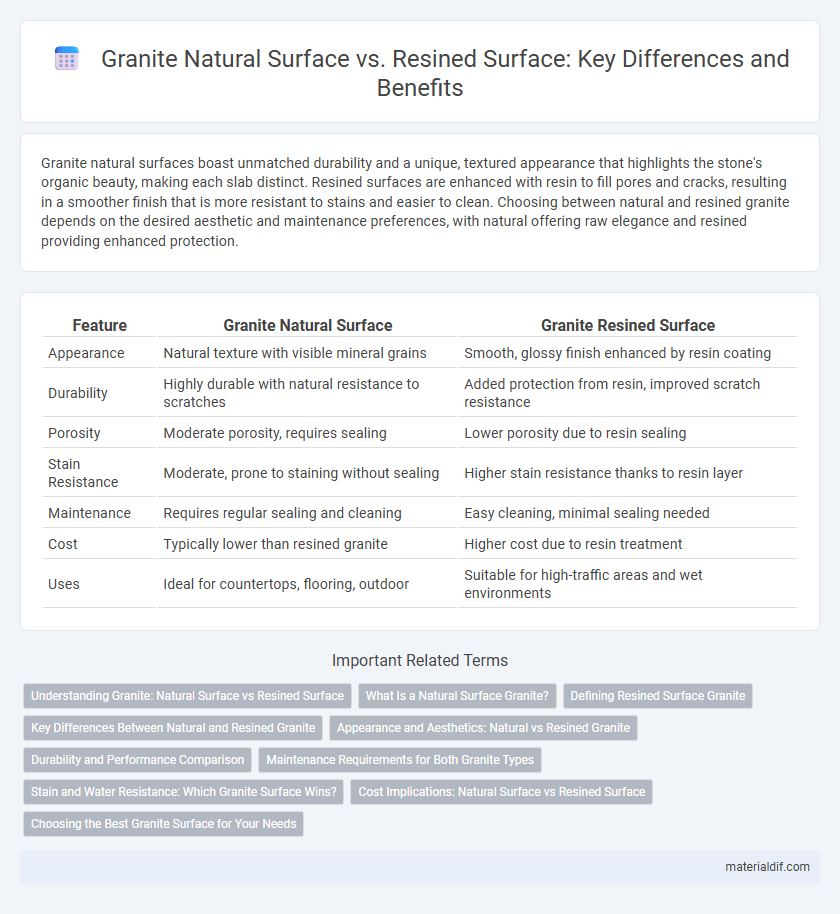Granite natural surfaces boast unmatched durability and a unique, textured appearance that highlights the stone's organic beauty, making each slab distinct. Resined surfaces are enhanced with resin to fill pores and cracks, resulting in a smoother finish that is more resistant to stains and easier to clean. Choosing between natural and resined granite depends on the desired aesthetic and maintenance preferences, with natural offering raw elegance and resined providing enhanced protection.
Table of Comparison
| Feature | Granite Natural Surface | Granite Resined Surface |
|---|---|---|
| Appearance | Natural texture with visible mineral grains | Smooth, glossy finish enhanced by resin coating |
| Durability | Highly durable with natural resistance to scratches | Added protection from resin, improved scratch resistance |
| Porosity | Moderate porosity, requires sealing | Lower porosity due to resin sealing |
| Stain Resistance | Moderate, prone to staining without sealing | Higher stain resistance thanks to resin layer |
| Maintenance | Requires regular sealing and cleaning | Easy cleaning, minimal sealing needed |
| Cost | Typically lower than resined granite | Higher cost due to resin treatment |
| Uses | Ideal for countertops, flooring, outdoor | Suitable for high-traffic areas and wet environments |
Understanding Granite: Natural Surface vs Resined Surface
Granite natural surfaces exhibit a raw, unaltered texture characterized by inherent pores and minute fissures, enhancing their authentic appearance but requiring regular sealing to prevent staining. In contrast, resined granite surfaces involve filling these pores and fissures with a durable resin, resulting in a smoother, more polished finish that improves stain resistance and durability. Choosing between natural and resined granite depends on the desired aesthetic appeal, maintenance needs, and the specific application environment.
What Is a Natural Surface Granite?
Natural surface granite refers to granite that has not been treated with resin or other synthetic materials, preserving its original porous texture and natural imperfections. This type of granite showcases the authentic mineral composition and grain patterns formed through geological processes over millions of years. As a result, natural surface granite provides a more organic look and requires sealing to protect against stains and moisture.
Defining Resined Surface Granite
Resined surface granite refers to natural granite stone treated with a resin-based sealant that fills pores and small fissures, enhancing durability and stain resistance. This treatment improves the granite's surface smoothness and reduces porosity, preventing moisture absorption and minimizing the risk of cracks or chips. Resined granite maintains the natural aesthetics of the stone while offering enhanced protection compared to untreated natural granite surfaces.
Key Differences Between Natural and Resined Granite
Natural granite surfaces feature the stone in its pure, unaltered state, showcasing unique mineral patterns and porosity that allow for natural breathability and slight moisture absorption. Resined granite, on the other hand, is infused with epoxy or resin to fill micro-cracks and pores, enhancing durability, stain resistance, and giving a more uniform appearance with reduced absorbency. These differences affect maintenance requirements, with natural granite needing regular sealing, while resined surfaces offer easier upkeep and improved resilience against liquids and stains.
Appearance and Aesthetics: Natural vs Resined Granite
Natural granite surfaces showcase unique, organic patterns with subtle color variations and natural fissures that create a distinctive, timeless aesthetic. Resined granite enhances the stone's appearance by filling cracks and pores, resulting in a smoother, more polished look with intensified colors and reduced surface imperfections. The choice between natural and resined granite depends on whether a raw, authentic texture or a more uniform, glossy finish best suits the design preferences.
Durability and Performance Comparison
Granite natural surfaces boast exceptional durability, characterized by high resistance to scratches, heat, and wear, making them ideal for heavy-use areas in kitchens and bathrooms. Resined granite surfaces enhance durability by filling pores and micro-fissures with resin, increasing stain resistance and reducing the likelihood of moisture penetration and damage. Both surfaces perform well under regular maintenance, but resined granite requires less sealing and provides a more uniform surface for longevity in high-traffic environments.
Maintenance Requirements for Both Granite Types
Natural granite surfaces require minimal maintenance, needing only regular cleaning with mild soap and water to preserve their durability and natural finish. Resined granite surfaces, enhanced with epoxy resin, demand more careful upkeep to avoid damage to the resin layer, including avoiding harsh chemicals and abrasive materials. Both surfaces benefit from periodic sealing; however, natural granite typically requires sealing less frequently compared to resined granite to maintain stain resistance and surface integrity.
Stain and Water Resistance: Which Granite Surface Wins?
Granite natural surfaces exhibit superior stain resistance due to their dense, non-porous composition, minimizing absorption of liquids and preventing discoloration. Resined granite surfaces have an added layer of resin that enhances water resistance and seals micro-pores, providing better protection against liquid penetration and potential staining. When evaluating stain and water resistance, resined granite surfaces generally outperform natural granite by offering enhanced sealing properties and longer-lasting protection in high-moisture environments.
Cost Implications: Natural Surface vs Resined Surface
Natural granite surfaces typically incur higher initial costs due to extensive quarrying and finishing processes, but they offer superior durability and minimal maintenance expenses over time. Resined granite surfaces reduce upfront costs by sealing fractures and enhancing appearance, yet may require periodic resealing and repairs, increasing long-term maintenance expenditures. Budget considerations must balance upfront investment against potential maintenance costs when choosing between natural and resined granite surfaces.
Choosing the Best Granite Surface for Your Needs
Natural granite surfaces offer unparalleled durability and a unique, organic appearance with subtle color variations that resist heat, scratches, and stains over time. Resined granite surfaces are enhanced with a resin coating, providing a smoother finish and increased resistance to moisture and oil penetration, making them ideal for high-traffic or wet environments. Selecting the best granite surface depends on balancing aesthetic preferences, maintenance requirements, and the specific demands of your space, with natural granite favored for authenticity and resined surfaces preferred for added protection.
Granite Natural Surface vs Resined Surface Infographic

 materialdif.com
materialdif.com